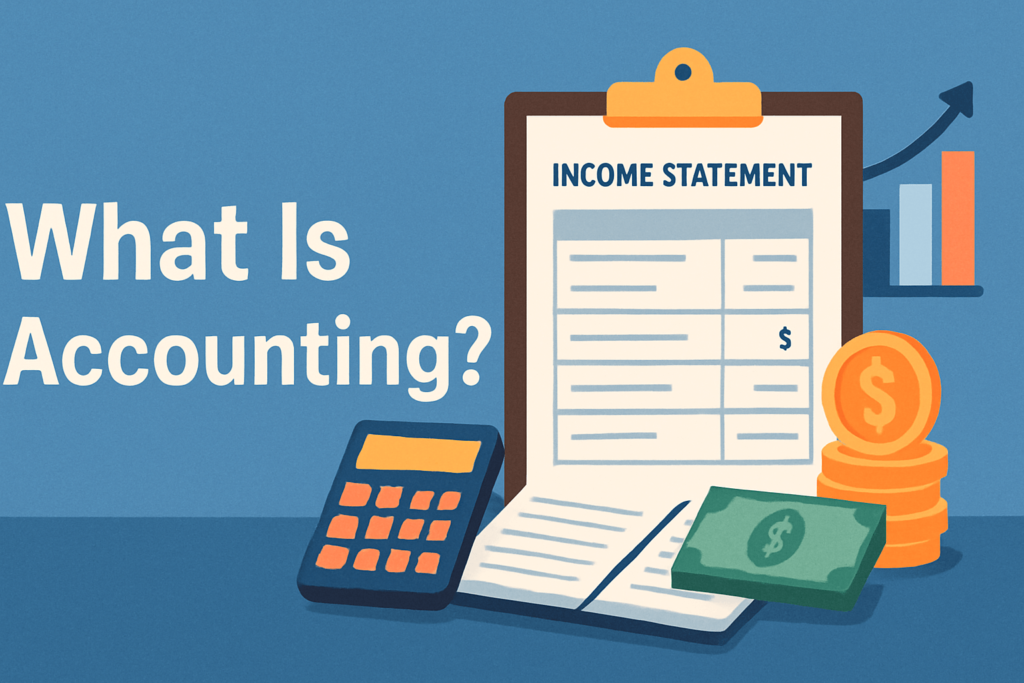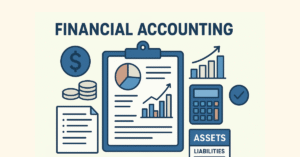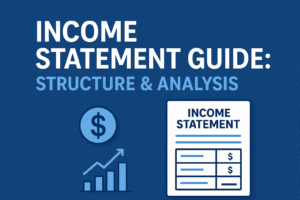Accounting is the process of tracking the income and expenses of a business or other organization. It plays a critical role in decision-making, compliance, and financial planning—making it the backbone of every successful operation.
What Is Accounting?
Accounting is more than just keeping track of numbers—it’s a comprehensive system that captures, organizes, and communicates a business’s financial activities. At its core, accounting is the language of business. It records every transaction, translates data into financial statements, and helps business owners, investors, and stakeholders make sound economic decisions. Accounting also ensures legal compliance, tax reporting, and organizational planning.
In today’s global economy, accounting is integral not only for businesses but also for governments, non-profits, and individuals. Every financial action, from purchasing inventory to paying salaries, impacts the financial position of an entity and must be documented accurately.
Key Takeaways
- Accounting provides structured, reliable financial information.
- It is essential for decision-making, compliance, and transparency.
- Different branches of accounting serve different business purposes.
- Accountants play strategic roles across industries.
- Technology and standards help ensure consistency and accuracy.
How Does Accounting Work?
Accounting works through a multi-step process that begins with identifying a financial transaction. Once recognized, the transaction is recorded in the company’s journal. These journal entries are then transferred to ledger accounts, where they’re sorted by category (assets, liabilities, income, etc.).
At the end of an accounting period, a trial balance is prepared to verify that debits and credits match. After making necessary adjustments for items like accrued expenses or depreciation, financial statements are created:
- Income Statement (shows profit or loss)
- Balance Sheet (shows assets, liabilities, and equity)
- Cash Flow Statement (shows cash inflow/outflow)
These reports summarize the financial performance and health of the organization, making them essential for internal decision-making and external reporting.
What Are the Types of Accounting Practices?
Accounting is not one-size-fits-all. Businesses require specialized accounting practices to suit specific operational needs. The main types include:
Managerial Accounting
Managerial accounting is designed for internal use. It provides detailed reports to help management plan, control, and make decisions. These reports often include budget forecasts, break-even analyses, and cost-benefit evaluations.
Example: A retail chain uses managerial accounting to allocate its advertising budget based on sales projections and store performance.
Cost Accounting
Cost accounting analyzes the cost structure of products and services. It determines the actual costs involved in production, helping businesses minimize waste and improve profitability. This branch is crucial for manufacturing industries.
Example: A factory calculates the cost of raw materials, labor, and overhead to assess the total cost per unit.
Tax Accounting
Tax accounting ensures compliance with tax regulations at local, state, and federal levels. It includes preparing and filing tax returns, identifying deductible expenses, and developing strategies to reduce tax liability legally.
Example: A startup may use tax accounting to claim R&D credits and reduce its tax burden.
Project Accounting
Project accounting tracks financials specific to a project. It helps monitor budgets, timelines, and resource usage. Industries such as construction, engineering, and consulting often rely on this accounting method.
Example: A software company uses project accounting to track development costs for a new app.
Financial Accounting
Financial accounting focuses on external reporting. It involves preparing standardized financial statements that adhere to GAAP or IFRS. These reports are shared with investors, lenders, and regulatory authorities.
Example: A public company files quarterly financial statements with the SEC to maintain investor transparency.
What Types of Careers Are in the Accounting Field?
Accounting offers a variety of career opportunities, each requiring unique skills and serving different sectors:
- Auditor: Examines financial statements and ensures compliance with laws and standards. Can be internal or external.
- Tax Accountant: Specializes in tax preparation, compliance, and strategic planning to reduce tax liabilities.
- Managerial Accountant: Provides internal management with cost analysis, budgets, and forecasting tools.
- IT Analyst/Accountant: Bridges the gap between finance and technology. Implements accounting software and cybersecurity controls.
- Controller: Oversees all accounting operations and ensures the accuracy of financial reporting.
- Forensic Accountant: Investigates financial discrepancies and fraud. Often works with law enforcement or as expert witnesses in litigation.
These roles exist across industries including finance, healthcare, manufacturing, public service, and more.
What Are Accounting Standards?
Accounting standards are formal guidelines that govern how financial statements should be prepared and presented. They ensure consistency, reliability, and comparability of financial information across entities and time periods.
Major Frameworks:
- GAAP (Generally Accepted Accounting Principles): Standard in the U.S., issued by the Financial Accounting Standards Board (FASB).
- IFRS (International Financial Reporting Standards): Used globally, issued by the International Accounting Standards Board (IASB).
These frameworks standardize how to handle revenue recognition, inventory valuation, lease obligations, and more. Compliance helps build trust with investors and regulators.
What Are Major Accounting Software Platforms?
Technology has transformed accounting from a manual process to an automated, real-time operation. Popular accounting software platforms include:
- QuickBooks: Best for small to medium businesses. Offers features like invoicing, payroll, and financial reporting.
- FreshBooks: Ideal for freelancers and service providers. Known for its simplicity and intuitive interface.
- Xero: Cloud-based platform offering strong integration with third-party apps and bank feeds.
- Sage: Enterprise-level software with robust features including inventory management and analytics.
These tools reduce errors, enhance productivity, and improve decision-making by providing real-time financial insights.
What Is the Accounting Cycle?
The accounting cycle is an eight-step process businesses follow during each reporting period:
- Identify Transactions: Recognize and collect financial data.
- Record Journal Entries: Log transactions in chronological order.
- Post to Ledger: Transfer entries to appropriate accounts.
- Prepare Trial Balance: Ensure debits equal credits.
- Make Adjusting Entries: Reflect accrued or deferred items.
- Adjusted Trial Balance: Confirm new balances after adjustments.
- Prepare Financial Statements: Generate income, balance, and cash flow statements.
- Close the Books: Reset temporary accounts and prepare for the next cycle.
This structured approach ensures accurate, complete financial records.
Cash Method vs. Accrual Method of Accounting
Cash Method
Revenue and expenses are recorded when cash is received or paid. Simple and used by many small businesses.
Advantages:
- Easy to implement
- Reflects actual cash flow
Limitations:
- Doesn’t match income with related expenses
- Can distort financial performance
Accrual Method
Records revenue when earned and expenses when incurred, regardless of cash movement. Required for larger businesses and those with inventory.
Advantages:
- More accurate
- Matches income and expenses in the right period
Limitations:
- More complex
- Requires more tracking and documentation
Why Is Accounting Important?
Accounting isn’t just a back-office function. It’s essential for:
1. Company Growth
Analyzing profit margins, operating costs, and resource allocation enables strategic growth planning.
2. Securing Funding
Investors and lenders rely on accurate financial reports to assess risk and make funding decisions.
3. Owner Exit Planning
Whether selling a business or passing it to a successor, financial records determine valuation and transition strategy.
4. Managing Payments
Efficient payables tracking ensures timely vendor payments and avoids penalties.
5. Collecting Receivables
Good accounting tracks unpaid invoices and optimizes cash flow.
6. Legal Compliance
Governments require accurate records for tax and regulatory purposes.
Example of Accounting
A catering business earns $5,000 for an event in December but receives payment in January.
- Cash Method: Revenue recorded in January when payment is received.
- Accrual Method: Revenue recorded in December when the service was performed.
The method chosen affects when income appears on financial statements and influences tax planning and performance metrics.
What Are the Responsibilities of an Accountant?
An accountant’s duties go beyond bookkeeping. They include:
- Recording financial transactions accurately
- Preparing financial reports
- Managing payroll and taxes
- Conducting internal audits
- Advising on budgeting and cost control
- Ensuring compliance with laws and standards
Accountants are essential to a company’s financial health and sustainability.
What Skills Are Required for Accounting?
Success in accounting depends on both technical expertise and soft skills:
- Attention to Detail: Accuracy in numbers is non-negotiable.
- Analytical Thinking: Ability to interpret financial data.
- Organization: Managing deadlines and records effectively.
- Ethics: Maintaining confidentiality and integrity.
- Communication: Explaining complex financial info clearly.
- Tech Proficiency: Using accounting software and Excel tools.
Why Is Accounting Important for Investors?
Investors rely on accounting information to make investment decisions. It helps them:
- Evaluate profitability and growth potential
- Assess risk and debt levels
- Understand cash flow
- Compare companies across industries
Transparent accounting builds investor confidence and promotes fair capital markets.
Final Thoughts
Accounting, in all its forms and functions, is the foundation of informed decision-making and long-term success in business. Whether you’re a startup founder, a corporate CFO, or an investor, understanding the mechanics and importance of accounting gives you a strategic edge.







